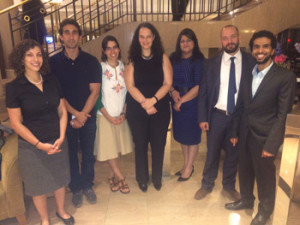September 23, 2015

with Network members in Prague
The Middle East Next Generation of Arms Control Specialists Network (MENACS) met in mid-August in Prague, Czech Republic, for its annual meeting. The objective of the Network is to develop and nurture indigenous arms control, nonproliferation, and disarmament processes and expertise in the Middle East through capacity building, training, regional dialogue, knowledge dissemination, and teaching-by-example.
The Network members are up-and-coming young people from the region with wide ranges of interests in nonproliferation and regional security issues, with an emphasis on weapons of mass destruction (WMD). They have experience working in academia, think tanks, government, and international organizations and come from all Middle East countries. The group works around projects that its members identify and implement.
In the August meeting, the group reviewed its past years’ projects, which included:
- Launching the website Arms Control and Regional Security for the Middle East, a public tool designed to inform the general public, scholars, and decision makers in the Middle East and beyond about WMD threats and practices of arms control and nonproliferation in the region and ways to incorporate them in a broader regional security framework.
- Middle East WMD-Free Zone Conference Simulation (WMDFZ) in the Middle East, where the Network succeeded in negotiating a final declaration based on a grand bargain reached between the parties. Results were shared with officials from the region, the co-conveners (US, UK, and Russia), the facilitator of the conference, and were also cited in articles.
- Published joint articles in array of international media, including: Global Post, Al Monitor, Arms Control Wonk, The National Interest and Ha’aretz.
- Conducted a journalists training (June 2014, Istanbul, Turkey; December 2015, Vienna, Austria)
- Co-authored chapters with senior regional experts in an edited book, Regional Security Dialogue in the Middle East, such as former Egyptian diplomat Nabil Fahmy and Saudi Arabia’s HRH Turki al Faisal.
- Identifying safety, security, and safeguards measures for emerging nuclear energy in the Middle East;
- Publishing a report, which identified steps essential for the negotiation and implementation of a WMDFZ in the Middle East.
The group also set its agenda for the upcoming years and laid out projects to be initiated. Each member introduced new project ideas, and the group is currently working on a compendium of the suggested projects to begin fundraising efforts. Some of the suggested projects include:
- A mentorship program by and for Middle Eastern women working in nonproliferation and disarmament. Women in high-level positions would mentor women in junior-level positions.
- A second WMDFZ conference simulation with the participation of retired diplomats from the region.
- Training courses for officials in the region on nonproliferation and disarmament.
- A meeting of religious leaders from the three major faiths in the region to discuss religious permissibility (or lack thereof) of WMD in each of the respective religions. The final outcome of the meeting would be a joint statement of the findings.
- A monthly feature on the MENACS website that highlights people from the region working on nonproliferation and disarmament issues.
About the Next Generation of Middle East Experts in Prague
The Network was established in 2010 by CNS’s Director of the Middle East Nonproliferation Program, Dr. Chen Kane.
Contact Information
Tiara Shaya, Network Coordinator
[email protected]
